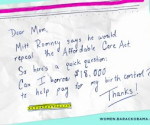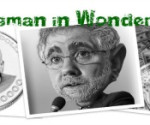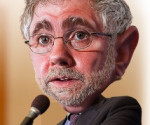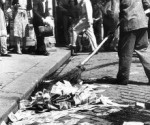Rabbit holes and rabbits from the hat – Krugman in Wonderland
I find it ironic that given this blog deals with Paul Krugman’s residence in Economic Wonderland, The Great One himself has referred to the “rabbit hole” of Wonderland in his latest bout of Wisdom From On High (or at least from Princeton). As I read Krugman’s current attempt to rewrite history, I find that he pretty much is sticking to the same fanciful script and calling it economics. In other words, while claiming others are living in Wonderland, Krugman actually is writing about himself.
Before going on, however, let me say how grateful I am to Krugman for his willingness to sit through yet another Republican presidential debate and to be our eyes and ears. Some of us unfortunates who either cannot find an available TV or who are too busy looking after our families to watch thank him for his important contribution to the civil and political fabric of our nation. Thanks, Paul!
Of course, because I have not watched the debates, I have been unable to catch the latest on 9-9-9 (which makes me think of the song from the Beatles’ white album in which we hear over and over again, “Number nine, number nine, number nine”….) or Ponzi schemes or the name of Rick Perry’s hunting club. You know, the important things.
However, I have my doubts that even the Republicans are blaming Barney Frank for this entire mess, although he did play an important role by shilling for Fannie and Freddie and helping to keep them alive in the days when they were leveraged about 75 to one. In other words, if they wanted to put some of the blame on Steven Gobi’s good friend, I would not object.
However, it seems that Krugman really wants us to believe that the ENTIRE crisis was simply generated by the failure of unregulated private enterprise and that government did only good. You think I exaggerate? Read on:
In the real world, recent events were a devastating refutation of the free-market orthodoxy that has ruled American politics these past three decades. Above all, the long crusade against financial regulation, the successful effort to unravel the prudential rules established after the Great Depression on the grounds that they were unnecessary, ended up demonstrating — at immense cost to the nation — that those rules were necessary, after all.
But down the rabbit hole, none of that happened. We didn’t find ourselves in a crisis because of runaway private lenders like Countrywide Financial. We didn’t find ourselves in a crisis because Wall Street pretended that slicing, dicing and rearranging bad loans could somehow create AAA assets — and private rating agencies played along. We didn’t find ourselves in a crisis because “shadow banks” like Lehman Brothers exploited gaps in financial regulation to create bank-type threats to the financial system without being subject to bank-type limits on risk-taking.
Yes, you see that the financial deregulation that began in the late 1970s and was strongly bolstered by DIDMCA in 1980 was the product of Republican rule and ideology. (And Krugman has written that many times, folks, like it or not.)
Whoops! Democrats had the presidency AND overwhelming majorities in the House and Senate during those years. Being that Ted Kennedy was a major architect of deregulation, I had no idea the guy was a closet Republican, but there it is. Krugman has a Nobel, so he ought to know. (Notice that Krugman never even tries to look at what was happening during that time, events that sparked the deregulation movement. Instead, he rewrites history and attacks anyone who might challenge his false claims.)
Furthermore, let us look at why this housing bubble came about. In Krugman’s Wonderland, banks just all of a sudden started going wild with mortgage lending about 20 years after some of the handcuffs had been taken off. There is no causality, nothing other than some of the regulations had been removed two decades before.
In Krugman’s Wonderland, there are no government programs to promote home ownership, and the Federal Reserve System played absolutely no role at all in helping to provide the massive amount of funds that went into this bubble. There was no Community Reinvestment Act and no directives from the federal government that lenders target people with bad credit scores or no savings and tailor loans to fit their situations. Furthermore, there was no encouragement from Alan Greenspan’s and Ben Bernanke’s Fed to lenders that if they got into a pinch, that Uncle Sugar would provide the “liquidity” to get them through the crisis. No, none of that.
Wonderland Economics, you see, has no cause-and-effect. The government changes some of the rules for banking and — Voila! — years later, all of the lending institutions suddenly run off the cliff like a pack of lemmings. There is no reason, nothing. It just happens.
But, Krugman has yet another howler up his sleeve:
The demonization of Mr. Frank aside, it’s now obviously orthodoxy on the Republican side that government caused the whole problem. So what you need to know is that this orthodoxy has hardened even as the supposed evidence for government as a major villain in the crisis has been discredited. The fact is that government rules didn’t force banks to make bad loans, and that government-sponsored lenders, while they behaved badly in many ways, accounted for few of the truly high-risk loans that fueled the housing bubble.
I spoke to some real estate lawyers during the aftermath of the collapsing bubble, and they told me that both federal AND state government officials were pressuring lenders to reduce their underwriting standards, something that Krugman knows, but cleverly denies. To add to the government’s role, Veronique de Rugy points out:
The federal government’s role in the housing market goes back at least to 1938, but that role changed fundamentally in the 1990s when the government made a push to increase homeownership in the United States. At that time, the federal government pursued several policies that were meant to encourage banks to lend money to lower income earners and to give incentives to low income earners to buy houses. The result, as we now know, was a gigantic amount of subprime mortgages at a time when house prices were starting to go down.
Furthermore, we see from Daniel Indiviglio at the Atlantic:
Does Wall Street deserve some of the blame? Absolutely. It was concentrating on the profit that could be made and ignoring risk. Mortgage underwriters, investment banks, rating agencies, and investors all made this mistake. Of course, the GSEs did the same thing. And remember, they also got the party started to begin with. It was their incredible performance from 2001-2003 that made banks take notice.
So were the GSEs the only cause of the housing bubble? Of course not. But it doesn’t make any sense to say that they weren’t a central cause or didn’t play a major role. If you look at their enormous quantity of originations over the past decade, their presence is undeniable. And if you look at the losses they’ve sustained since then — which have led to a $148 billion bailout so far — it’s hard to keep a straight face and say they paid enough attention to risk.
I would agree wholeheartedly with both de Rugy and Indiviglio. The banks and financial houses were irresponsible (that is a most mild term, as I cannot think of one that actually fits their conduct this early in the morning), but the fuel for their fires came in large part from government-sponsored entities.
Krugman wants us to believe that Wall Street entities all of a sudden came up with the idea of throwing huge amounts of resources into an unsustainable housing bubble. It just happened; there was no causality, nothing.
But Krugman is not done. No, while he writes of “rabbit holes,” he also is promoting the economics of “pulling rabbits from hats.” Yes, President Obama can turn things around with his latest “jobs bill” or the Fed can push “aggregate demand” through Operation Twist, and the beat goes on.
Krugman wants us to believe that government can subsidize us into recovery through “green jobs” while cutting out nearly 10 percent of the current electricity grid through environmental regulations. He wants us to believe that government can discourage capital formation through taxes and regulation and then claim it doesn’t matter since there is “unused capacity” out there, so capital formation isn’t necessary.
Perhaps I am a romantic, but I have this quaint idea that decorated academic economists should not act as shills for a particular candidate or political party. Furthermore, I have this quaint notion that economists really should be looking at cause-and-effect, as opposed to making political claims of good and evil, and then saying government is good (when the Democrats are running it) and private enterprise is evil (because profits are evil).
That is not economics. That is Politics in Wonderland.
William L. Anderson is an author and an associate professor of economics at Frostburg State University in Maryland. He is also an adjunct scholar with the Mackinac Center for Public Policy as well as for the Ludwig von Mises Institute in Alabama.
Read more at “Krugman-in-Wonderland”














